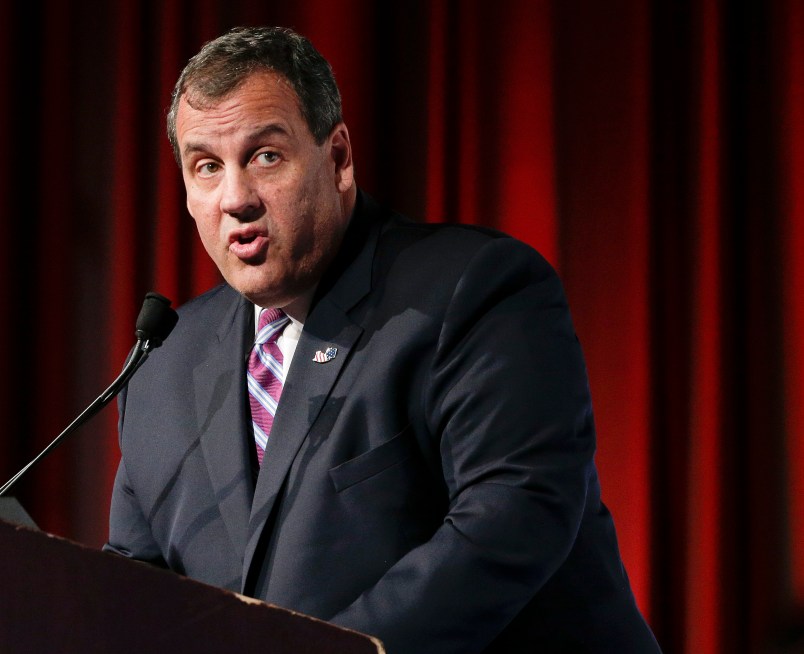In an order signed late Friday afternoon, the federal judge presiding over the federal trial of two former members of N.J. Gov. Chris Christie’s inner circle issued a subpoena ordering the governor’s lawyers to hand over notes and computer files used to produce the so-called Mastro Report.
Named after Randy Mastro, a partner at the white collar firm Gibson Dunn & Crutcher, the taxpayer-funded report was crafted at Christie’s behest in early 2014 to support his claim to have had no knowledge of the planning of four-day-long lane closures at the George Washington Bridge. According to federal prosecutors, the target of those closures was Fort Lee Mayor Mark Sokolich, a Democrat who declined to endorse Christie’s 2013 re-election campaign.
As he begins his presidential campaign, Christie has continued to point to the Mastro Report as an exhaustive investigation that provided a definitive judgment, clearing him of any culpability in Bridgegate.
Now that story may get more complicated.
As I wrote in June here at TPM, the Mastro Report isn’t an ordinary government-funded investigation. It had a more than 300-page-long narrative and an appendix of “interview memos” that were summaries of the meetings held between Gibson Dunn attorneys and members of the Christie administration. Those memos intentionally omitted any direct quotes from the interviews they were based on.
The report itself, however, made many specific claims – for example, suggesting that former Christie deputy chief of staff Bridget Anne Kelly might have been motivated to act in response to a recent breakup – that weren’t reflected in the memos. Nor did Gibson Dunn lawyers interview many of the principal figures in the Bridgegate saga, including Kelly and former Port Authority appointees Bill Baroni (both now facing federal indictments) and David Wildstein (who is cooperating with federal prosecutors). Nor did Gibson Dunn attorneys interview former Port Authority chairman David Samson – a credibility-straining omission that the report made no effort to explain.
In late May, Bridget Kelly’s attorney, Michael Critchley, asked federal district Judge Susan Wigenton to issue a subpoena to Gibson Dunn for any notes or transcripts from the interviews the firm conducted to produce the Mastro Report. Notably, prosecutors in the Bridgegate case issued a letter supporting Critchley’s request.
But in a June 8 letter to the judge, Randy Mastro insisted that it was a “matter of public record” that his firm did not “transcribe or record our interviews” with members of Christie’s staff. None of the documents being sought by Critchley, Mastro insisted in that letter, “ever existed.” According to Critchley, however, witnesses have said that junior associates at Gibson Dunn were present and taking near-verbatim notes of interview meetings. One person I spoke with who was interviewed for the report had the same recollection.
It’s possible that Gibson Dunn shredded or disposed of this material, but that would seem to violate the terms of their multimillion dollar deal with the New Jersey Attorney General’s office to represent Gov. Christie “in all pending Legislative and United States Attorney inquiries and related matters” surrounding Bridgegate. Under the terms of the state’s retention policy for outside counsel, Gibson Dunn was obligated to keep any work product and retain documents for a period of seven years. That obligation is clearly spelled out in state guidelines that Gibson Dunn agreed to follow as part of their January 2014 retention agreement, which I obtained through an Open Public Records Act request with the New Jersey Attorney General’s office.
Under the judge’s ruling, Randy Mastro and his team must now turn over “any and all handwritten or typed notes, stenographic transcripts and audio and/or video recordings of witness interviews conducted by Gibson Dunn” along with “any and all metadata and the document properties for all typed notes and interview summaries created during interviews of witnesses during Gibson Dunn’s representation of the Office of the Governor of New Jersey” from the time the firm was hired by the state in January 2014 until the present.
Clearly, the judge – and perhaps prosecutors – simply don’t believe that Gibson Dunn has nothing to turn over. It is possible that Mastro, in a June 10 communication referred to by the judge’s order but not in the public domain, revealed the existence of material. Either way, the firm has 45 days to turn over material or file objections with the court.
In a statement to New Jersey media outlets, Critchley said on Friday that “Ms. Kelly has always maintained that she was never involved in any effort to punish Mayor Sokolich for not endorsing the governor. We anticipate that the Gibson Dunn notes will back up what Ms. Kelly has maintained and what Mr. Mastro stated during his Mar. 27, 2014 press conference when he said, ‘The evidence does not establish that the ulterior motive was to target Mayor Sokolich because he did not endorse Governor Christie for re-election. In fact, there’s substantial contrary evidence.’”
Stay tuned.







Upon hearing the news Christie responded, “I’ll have three deep-dish combinations.”
Expect Christie’s team to selectively “forgive” this particular non-compliance incident.
Do I hear a large claim of “executive privilege” coming up?
Maybe – But I don’t think that would be supported by the terms of the retention agreement –
> Stay tuned.
And ‘Stay Tuned,’ we will. Thank you, Brian Murphy for your great reporting on the (slowly) unfolding story.